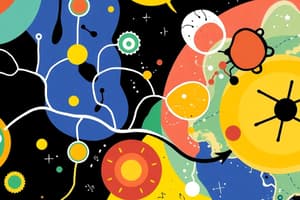Podcast
Questions and Answers
What is the first step of the scientific method?
What is the first step of the scientific method?
Which of the following best describes a scientific law?
Which of the following best describes a scientific law?
Which branch of science focuses on the study of living organisms?
Which branch of science focuses on the study of living organisms?
What is a characteristic of scientific theories?
What is a characteristic of scientific theories?
Signup and view all the answers
What is the purpose of communicating results in the scientific method?
What is the purpose of communicating results in the scientific method?
Signup and view all the answers
Which of the following is NOT a step in the scientific method?
Which of the following is NOT a step in the scientific method?
Signup and view all the answers
What distinguishes scientific models from scientific theories?
What distinguishes scientific models from scientific theories?
Signup and view all the answers
Which scientific theory explains the mechanism of natural selection?
Which scientific theory explains the mechanism of natural selection?
Signup and view all the answers
Study Notes
Scientific Method
- Science is a systematic approach to understanding the natural world
- It involves observation, experimentation, and the development of theories to explain observations
- The scientific method is a cyclical process, not a linear one
- Key steps:
- Observation: noticing and describing a phenomenon
- Question: formulating a question about the observation
- Hypothesis: proposing a testable explanation for the observation
- Prediction: stating what will happen if the hypothesis is correct
- Experiment: performing a controlled test to gather data
- Analysis: analyzing the data to see if it supports the hypothesis
- Conclusion: determining if the data supports or refutes the hypothesis
- Communication: sharing the results with the broader scientific community
Branches of Science
- Science is divided into many branches, each focusing on a specific aspect of the natural world.
- Examples include:
- Physics: the study of matter, energy, and their interactions
- Chemistry: the study of the composition, structure, properties, and reactions of matter
- Biology: the study of living organisms and their interactions
- Earth science: the study of the Earth's physical systems, including geology, meteorology, and oceanography
- Astronomy: the study of celestial objects and phenomena
Scientific Theories
- A scientific theory is a well-substantiated explanation of some aspect of the natural world that is acquired through the scientific method and repeatedly tested and confirmed through observation and experiment.
- Theories are not guesses or conjectures; they are the best explanations available based on current evidence.
- Theories can be modified or replaced as new evidence emerges.
- Examples of scientific theories include the theory of evolution by natural selection, the theory of relativity, and the germ theory of disease.
Scientific Laws
- Scientific laws describe relationships between observable phenomena.
- Laws are concise statements that predict what will happen in specific situations.
- Laws are based on observations and experimentation but do not explain why those things happen.
- Examples include Newton's law of universal gravitation and the law of conservation of energy.
Scientific Models
- Scientific models are representations of objects or systems that are too large, too small, too complex, or too dangerous to study directly.
- Models can be physical, mathematical, or conceptual.
- Models help to visualize and understand complex phenomena.
- Examples: A scale model of the solar system, a mathematical equation describing planetary orbits, or a diagram showing the flow of energy in an ecosystem.
Limitations of Science
- Science relies on empirical evidence, so it cannot answer all questions.
- Science cannot address questions of morality, ethics, values, or subjective experience.
- Science operates within a framework of assumptions (e.g., naturalism) about the world that may not be universally accepted.
- Scientific knowledge is tentative and subject to revision as new evidence becomes available.
- Some phenomena are beyond the current capabilities of science to study (e.g., consciousness).
Studying That Suits You
Use AI to generate personalized quizzes and flashcards to suit your learning preferences.
Description
Explore the fundamental principles of the scientific method and its key steps, from observation to conclusion. Additionally, discover the various branches of science that focus on different aspects of the natural world, such as physics and biology. Understand how these elements contribute to scientific inquiry and knowledge production.




